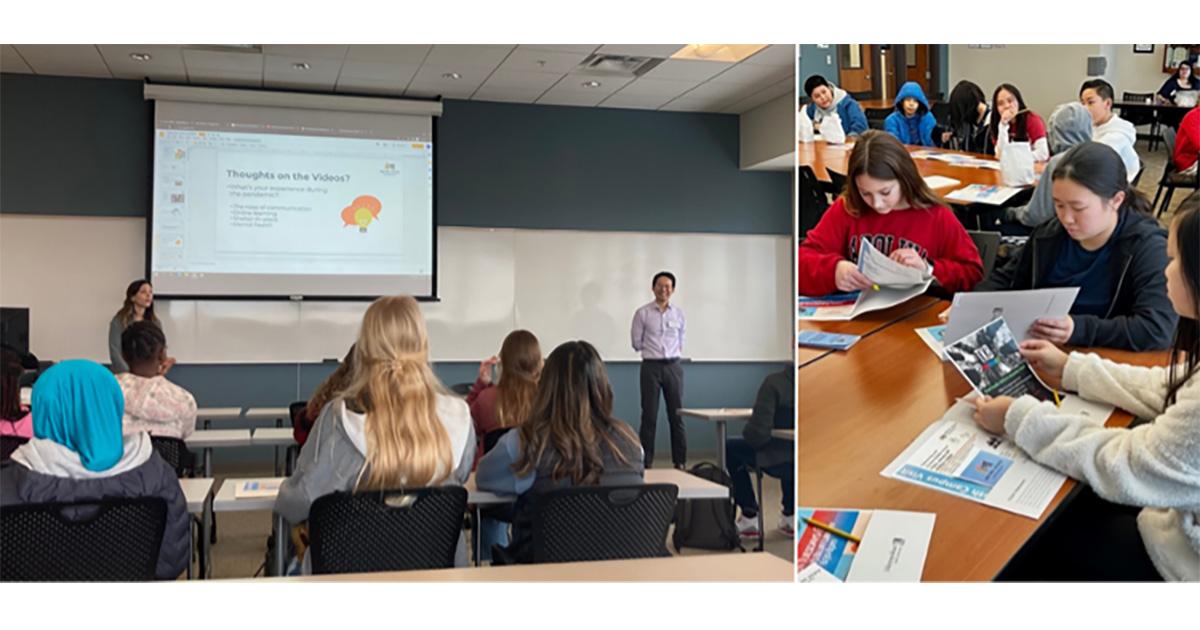
by Padra Lor, student writer
With the pandemic winding down and Metro State University returning to more in-person classes last fall, so, too, did Fall 2022 mark the return of in-person Youth Campus Visits (YCV), an outreach program for middle- and high-schoolers organized by the Institute of Community Engagement and Scholarship. Established in 1994, the program has grown and evolved, giving area youth the chance to explore university life and engage in workshops facilitated by Metro State students, staff, faculty, and community partners. Exposure to the university encourages younger students to begin formulating ideas about what they would like out of their post-secondary education and to consider that path—and Metro State!—in their futures.
When the pandemic hit, the YCV adapted. Community Engagement’s student coordinators created online workshop materials for partnering schools, supporting teachers and maintaining YCV’s goal of introducing youth to a college-like experience even while school-aged youth were learning on-line. Since Fall 2022, Community Engagement staff have guided two YCV student coordinators—Kailyn Thao (junior) and Peng Moua (senior)—in bringing a youth campus experience back to real life.
Both student coordinators prepare for and facilitate the visits themselves, engaging with students from the moment the bus arrives until departure time. The day’s activities create ample opportunity for youth to ask questions of the student coordinators, get comfortable and see themselves in a university environment. Kailyn and Peng both aspire to make a positive impact on youth who visit Metro State.
School representatives affirm that our student coordinators do, indeed, make a big difference. Ashley Lopez, community engagement coordinator: Literacy and Youth Outreach, notes that “Chaperones tell me that students remember these visits. It sticks with them for a long time.” Anecdotally, we know that many current Metro students participated in campus visits earlier in their lives. Ashley is hopeful that the visits can expand and grow, as she says that “this is the time where students are eager and ready to learn, this is the time to plant seeds into their brains that higher education is possible, especially if they’ve never entertained the possibility of higher ed before.”
Kailyn, who started her position two years ago, coordinates information among the parties involved in the YCV—school contacts, workshop leaders, and others involved at Metro State. For Kailyn, this work-study role has offered more than financial aid. Importantly, she feels, with the support she has received from the Institute, she's acquiring organizational and communication skills that will be greatly beneficial to her career too.
Peng, meanwhile, oversees the YCV scheduling process and prepares materials for the visits. Peng feels that he is seen as a bigger brother, as someone who can set a good example, recognizing that middle- and high-school students are often open to positive influences. He wants them to grow, make good decisions, and help them face their fears about their futures. In fact, he’s developed a workshop to suit exactly that purpose, in which youth are guided in writing scary fictional stories, creating a platform for sharing and combatting fears together. Peng says, “it gets harder after high school, but you have lots of people to help support you and you're not alone.”
YCV workshops have involved a multitude of topics in STEM, arts, health and much more. Each is designed to offer new knowledge and ways to think about the world while also building life skills—all in a way that showcases the leader’s expertise, appeals to young people, and showcases a college campus. Faculty Librarian Dawn Wing, for example, teaches students how to create their own comics while Suzanne Nielsen, associate professor of Fine Arts, gives pointers on how to draft a great story in only 200 words. Tammy Durant, associate professor of Language and Literature, led “Harlem Speaks to the Past” while upper-division computer science majors have offered guidance for youth to protect information—and their reputations—online. Community partners have included a judge who’s addressed money management (think, bankruptcy court!), naturalists, digital artists and so much more.
Community Engagement is especially grateful to faculty who contribute time to develop workshops as a service to the university and the community. Their crucial contributions not only leave a legacy for Metro State in the minds of youth participants, but also give faculty members the chance to test a new area curriculum, fulfill Metro State’s community engagement mission, and—bonus!—include this work in tenure and promotion documentation. Interested faculty members, please contact Ashley Lopez at ashley.lopez@metrostate.edu or community.engagement@metrostate.edu.
As youth campus visits continue throughout the year, the student coordinators will assume increasing responsibility from communicating with schools, to developing their own workshops, to serving as robust ambassadors of the university. They are becoming stronger leaders while building a multitude of professional skills that will be useful in any field or work environment. Now back in full swing, Community Engagement is pleased to have a meaningful impact on area school youth and student coordinators as well, supporting both groups to become the best version of themselves.
